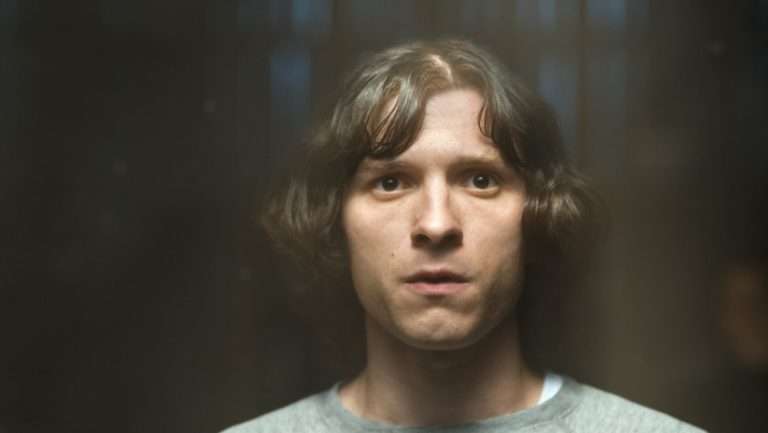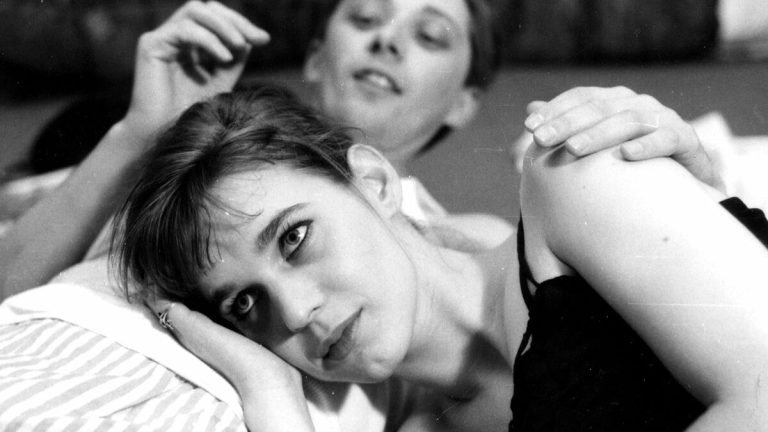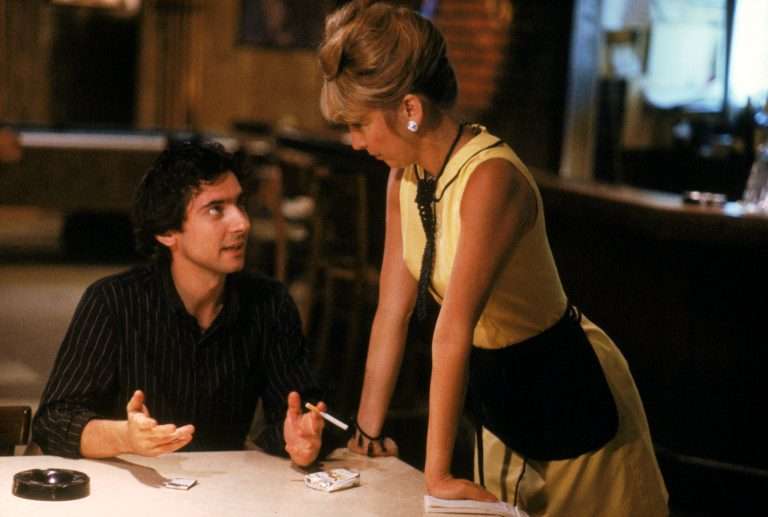One of film criticism’s tropes is to praise a sports movie by claiming it isn’t about sports. Sean Durkin’s biographical “The Iron Claw” is indeed a great sports movie that’s got a lot more on its mind than the field of athletic endeavor in question, but it’s also not the case that professional wrestling is immaterial to the film’s thematic aims. Much ink has been spilled by academics pathologizing the entertainment form as a kind of nationalistic wish-fulfillment. While it would be disingenuous to call “The Iron Claw” a treatise on American exceptionalism, Durkin does adopt a clinical perspective toward wrestling and its fandom.
Moreover, the reductive, sensationalistic scripts typical to “kayfabe” are a model for the way WCCW promoter Fritz Von Erich (Holt McCallany) raises his four sons – Kevin (Zac Efron), David (Harris Dickinson), Kerry (Jeremy Allen White), and Mike (Stanley Simons) – ascribing the consequences of his own hubris to external forces plotting their downfall. The film’s title refers as much to the Von Erichs’ signature finishing move as it does to the tyrannical reign the boys are subject to under their father’s roof.
Having lost an older sibling by the time he was six years old, Kevin has known tragedy his entire life. Fritz tried to protect him and his brothers – and his own legacy – from the “Von Erich curse” by turning them into athletes; his wife, Dottie (Maura Tierney), made them God-fearing. The struggle between grace and nature, established by a stunningly photographed black-and-white prologue (and not the only point of comparison between “The Iron Claw,” with its sober depiction of the afterlife, and the work of Terrence Malick), elucidates Kevin’s inner turmoil as much as it thematically contextualizes Durkin’s uncanny blend of dispassionate formalism and deep-seated, intimate spiritualism. “The Iron Claw” tonally splits the difference between “Warrior” and “Foxcatcher.” But in its focus on hereditary bad luck – and lush vision of backwater Americana – the film makes a more interesting pair with “The Place Beyond the Pines.”
Though “The Iron Claw” details a family’s grief and misfortune, it is foremost about one man succumbing to mysticism amidst recurring personal tragedy. When we first meet Kevin, he’s wary of but generally flippant toward the family curse; years later, he’s afraid to come near his children for fear of dooming another generation. Zac Efron’s deeply felt, Oscar-worthy turn is aided by a uniformly excellent cast. Much will deservedly be written about Holt McCallany, Jeremy Allen White, and Harris Dickinson, but the supporting MVP may be Lily James, who emotes with limited screen time a relationship drama about a woman dealing with her husband’s slow mental breakdown that mostly happens off-screen but is nevertheless integral to the film’s emotional throughline.
When Durkin does lean into the mythos and artificial stakes of kayfabe wrestling, the purpose is psychological rather than voyeuristic. The moments leading up to Kevin’s meeting in the ring with Ric Flair (Aaron Dean Eisenberg) assume the dualistic worldview Fritz instills in his children, only to be comically subverted when Kevin’s boozy opponent invites him to get wasted after their brawl. Kevin’s subsequent recognition of the absurdity inherent to the family business proves to be his salvation, liberating him from the self-made Von Erich mythology and thereby making him his parents’ only surviving child.
Underscoring the point symbolically is an original song, “Live That Way Forever,” from Arcade Fire’s Richard Reed Parry (who also composed the score, a vital element to the film’s foreboding atmosphere) and his wife, Laurel Sprengelmeyer. First played over a scene that epitomizes precisely the way Kevin would like to live forever, the song becomes melancholic and out of tune as greater pain befalls the Von Erich clan. Only when Kevin begins to move on from the tragedy that’s overtaken his life do the notes once again come into focus. Similar touches throughout the film, of which this is a minor example, enrich its more directly heart-wrenching qualities with symbolism that rewards critical reading.
“The Iron Claw” is as technically striking a piece of cinema as it is a profoundly moving one. Equipped with a tracking shot outside the Dallas Sportatorium that’s worthy of a “GoodFellas” or “Boogie Nights,” the film has the kinetic grit and methodical framing of a Gen X classic. “The Zone of Interest” may be 2023’s most surgically assembled achievement in filmmaking, but Mátyás Erdély’s haunted, poetic photography in “The Iron Claw” constitutes the most organic. Between water-colored vistas of the American southwest and a birdseye shot overlooking a funeral procession, there is so much to visually savor.
“The Iron Claw” is crafted with the formal rigor of “Tár” and carries the emotional impact of “Manchester by the Sea,” placing Sean Durkin in the echelon of modern masters like Steve McQueen. Is this a masterpiece? No other film I’ve seen this year comes closer.


![World War III [2022]: ‘Venice’ Review – A sharp and poignant tale of a film crew member pushed to the breaking point](https://79468c92.delivery.rocketcdn.me/wp-content/uploads/2022/09/World-War-III-2022-Movie-Review-1-768x512.jpg)

![Kingsman: The Golden Circle [2017] – A Superfluous Exercise in Excess](https://79468c92.delivery.rocketcdn.me/wp-content/uploads/2017/12/Kingsman-2-1-768x432.jpg)
![Ashleel Udyog Mitra Mandal [2020] Review: A Fever Dream that Works Only While It’s High on Fever](https://79468c92.delivery.rocketcdn.me/wp-content/uploads/2020/03/20200221_144650_0000.png)

